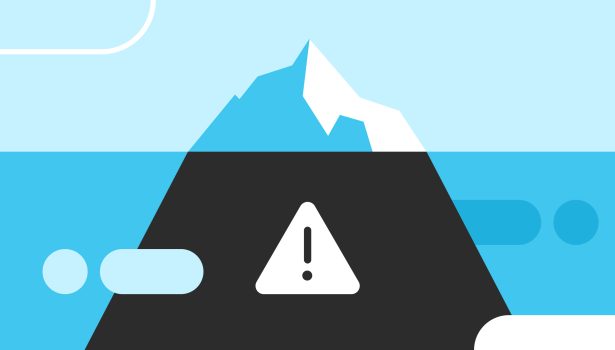
The sites you can openly browse on the internet are really only the tip of the iceberg. The rest of it is the ‘invisible’ web, or the deep web that also includes the dark web. This invisible part is much larger, is hidden behind encryption, and features countless web sources that require specialized software to access.
The dark web is the section of the deep web that can only be accessed via anonymizing browsers, for example, Tor. Historically a place for hackers, law enforcement officers and even spies, the dark web has this vibe of forbiddenness, mystery and danger associated with it. But is the dark web inherently dangerous, or does it depend on your intent and behavior once there? Let’s see.
Understanding the dark web
The dark web is a slice of the internet that’s not indexed and can’t be searched using common search engines like Google. It can’t be accessed via browsers like Google Chrome or Firefox either. Its use of specialized technology, privacy and decentralization are the key aspects making the dark web different from the rest of the internet:
- Technical architecture: The dark web protocols hide users’ IP addresses and locations, routing traffic randomly within the peer-to-peer network and this way enabling anonymous interactions. The websites there have the special “.onion” registry operator, so you’d need the Tor browser to access them.
- Decentralization: Due to this architecture, the dark web acts as a network of interconnected volunteer-operated relays, enabling peer-to-peer routing of traffic and making it impossible to identify both the traffic source and its destination.
- No indexing by search engines: You can’t discover the dark web content using search engines like Google or Yahoo as it’s blocked from indexing intentionally.
- Privacy and anonymity: As it’s impossible to identify the traffic source and the user’s location and activity on the dark web, people can communicate safely there without their personality disclosed. In this way, it is the place to be for activists, whistleblowers and journalists. This anonymity has the flipside, though, as it also attracts cybercriminals, hackers and scammers. This makes the dark web both illegal and dangerous for an unaware user.
Dark web vs. Deep web vs. Surface web
Right now, you’re browsing the surface web, or the open web—the part of the internet that’s perfectly discoverable using common tools like Google, Yahoo, Google Chrome, Microsoft Edge and the like. Websites, messengers and applications found on the surface web are indexed and can be openly accessed without needing to install any specialized software or use encryption. Examples include news websites, online marketplaces like Amazon, Wikipedia and public forums.
At the same time, the surface web is only a tiny portion of what’s out there. More than 90% of the internet is hidden, which means it requires authorization to access. This part of the web is called the deep web.
The deep web as a whole is not necessarily something illegal or dangerous, although it does include the dark web. On the broader deep web, you can simply find everything that’s not indexed by search engines, for example:
- Academic databases
- Medical records
- Banking account information
- Paywalled content
- Corporate intranets
- Private emails
- Staged websites and software under development blocked from indexation
Finally, we have the portion of the deep web that’s hidden intentionally and requires specialized software to access—that is the dark web. While browsing the larger deep web is totally legal and may only require basic credentials to access, using the dark web is more technically demanding and makes privacy and anonymity central to the browsing experience.
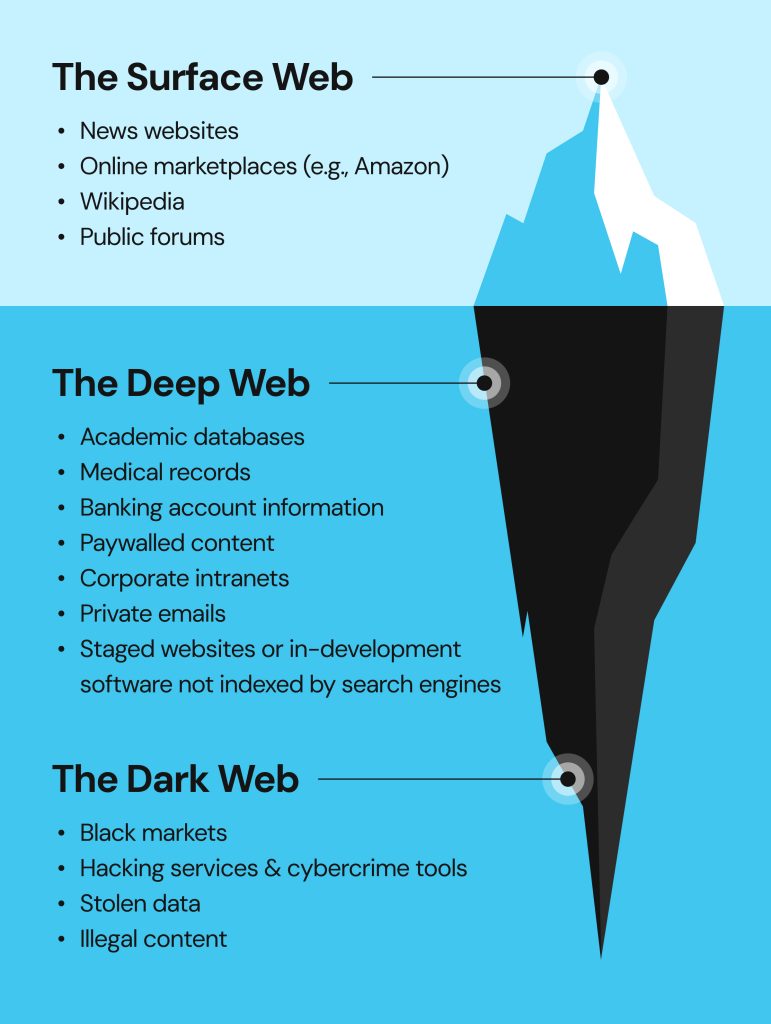
What can be found on the dark web?
What you can find on the dark web really depends on where you go. Some of it is perfectly legal, while the rest is shady and can be used for all sorts of illicit purposes. Let’s see how dangerous the dark web is in terms of what you can find there.
Legal or neutral content
The dark web’s anonymity attracts freedom-of-speech advocates who would otherwise risk retaliation for the information they disclose. On the dark web, there are platforms for whistleblowers and investigative journalists, banned literature, political content, censorship-free and LGBTQ+ forums, conspiracy theories and the like, running free thanks to the safe and unrestrictive nature of communication on the dark web.
Gray-area, risky and illegal content
Now beware, because this is what can get you into trouble. This is exactly the content that makes the dark web a place to avoid. For this same reason, the dark web is monitored by law enforcement agencies, intelligence services and cybersecurity experts to track down and prevent criminal activities.
The dark web’s notorious marketplaces sell everything from drugs, stolen data and hacking tools like malware and phishing kits to counterfeit goods and weapons. You can buy services too, many of which will give you a cold chill—like human trafficking, terrorism recruitment or hitman-for-hire.
Stolen data in particular is a booming business. On the dark web, you can find stolen and leaked credit card data, hacked credentials, email addresses, banking and social media accounts, identity theft services, Social Security numbers, passports and Green Cards.
The Dark Web Case Study by NordVPN reveals the numbers behind these deals:
- Payment card data can cost anywhere between $0.29 to $43 depending on the country.
- Banking accounts cost between $3,763 and down to $20 depending on the banking provider.
- Logins to payment processing services like PayPal and Payoneer cost from $16 up to $243.
- Voters’ emails in the US cost from $9.99 to $99.99, while general personal emails cost just under $199.99.
- Hacked accounts to digital services like streaming platforms and social media cost between $2 and $208.
These numbers reveal how stupidly cheap our personal data is to purchase, yet how costly and damaging it can be for the victims to mitigate the consequences of their data being stolen and exploited.
Who uses the dark web—and why?
As of April 2025, there are 2+ million daily users directly connecting to the Tor network. The United States is the top country by Tor network relay users, followed by Germany, India, Spain and Finland.
Who are these users? Cybercriminals, yes, but not only. You’d be surprised to know how diverse the dark web user base is. Let’s take a look, starting from the most benevolent user groups up to the most malicious ones:
- Curious individuals: motivated by exploration and fascination, these people browse out of curiosity with no intent to take part in any of the dark web activities.
- Researchers: motivated by education, users studying internet privacy, cybercrime, as well as the social, economic, behavioral and psychological aspects of anonymity.
- Journalists: using the dark web as a safe space to interact with their sources of information without risking their exposure, as well as for accessing censored information in their country.
- Whistleblowers: those looking for source protection as they tip off media and share their unique insights.
- Activists and dissidents: those who can’t safely express their views publicly, coordinating protests or resistance actions, sharing information against their political regimes, publishing banned materials, and driven by the freedom of speech and expression.
- Hackers: whether out of ideology or profit, they use the dark web as the outlet for their exploits, botnets and malware distribution, as well as to participate in hacker forums and collaborations.
- Fraudsters and scammers: motivated by financial gain, these users sell stolen personal data, offer their identity theft or document forging services, as well as run fake marketplaces, applying their scams and preying on people both outside and inside the dark web.
- Cybercriminals: the most notorious group of users making the dark web as dangerous as it is, selling all kinds of illicit goods, running darknet markets and offering criminal services, whether real or fake.
Is going on the dark web illegal?
Is it illegal to browse the dark web? The short answer is no, browsing the dark web itself is not illegal in most countries. Still, the legality of it depends on what you’re browsing, for what purpose and in what location.
To sum up:
- Downloading and using Tor is legal in most countries.
- Accessing .onion websites is legal unless content is illegal.
- Visiting illegal marketplaces is illegal everywhere.
- Sharing illicit content is a criminal offense.
- Anonymous communication is protected under free speech but it depends on the context.
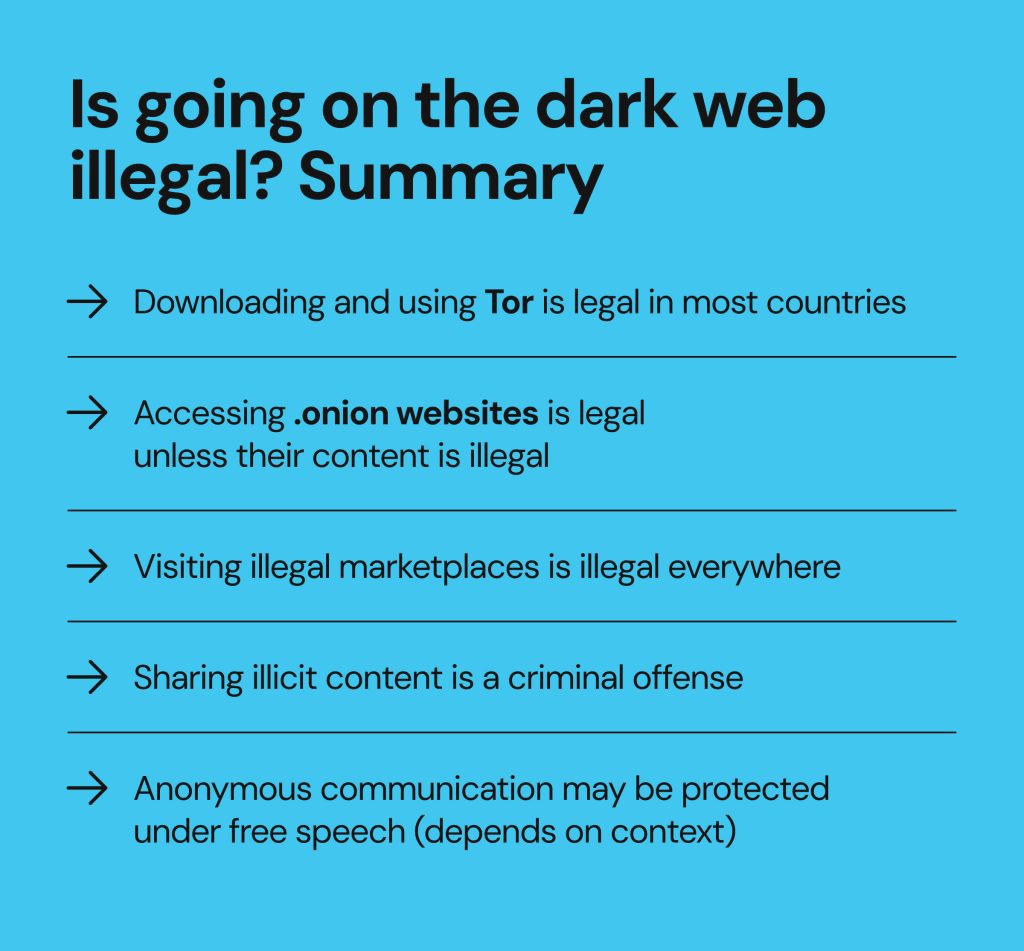
Legality of browsing the dark web
It’s not illegal to use the Tor browser or go on the dark web, in most countries. Accessing and interacting with illegal content is, regardless of your location.
Before going on the dark web, it helps to check if it’s legal in your country as the regulations differ from location to location.
For example, it’s perfectly fine to use the Tor browser in the United States provided you don’t break any laws. In the European Union, the use of the Tor browser is not forbidden but surveillance is present in some member states. In countries such as Russia, China and Iran, Tor is restricted, and the use of it can be monitored, result in scrutiny or even legal action.
If there are no location-specific restrictions regarding the use of Tor or similar dark-web browsing technology, you should still make sure your activity is within legal boundaries. As discussed above, there are many legitimate activities to do on the dark web. It’s used to protect free speech, avoid censorship and surveillance, or report lawfully obtained information.
In summary, you should always check your country’s laws and regulations, especially in areas with restrictive internet policies, and make sure not to engage in any illicit activity.
Illegal activities on the dark web
It’s easy to steer clear of illegal activities on the dark web once you know what they are. The rule of thumb is that they’re illegal everywhere—whether it’s the surface web, the dark web, or offline. So apply caution and discretion to avoid falling victim to cybercriminals there or becoming a subject of legal incrimination yourself.
Some of the most common illegal activities taking place on the dark web include:
- Buying and selling drugs, stolen data, weapons and fake documents
- Hiring illegal services, such as hacker-as-a-service or identity theft
- Participating in cybercrime, human trafficking and terrorist activity
- Distributing malware and arranging cyberattacks
- Viewing, downloading and possessing illegal content
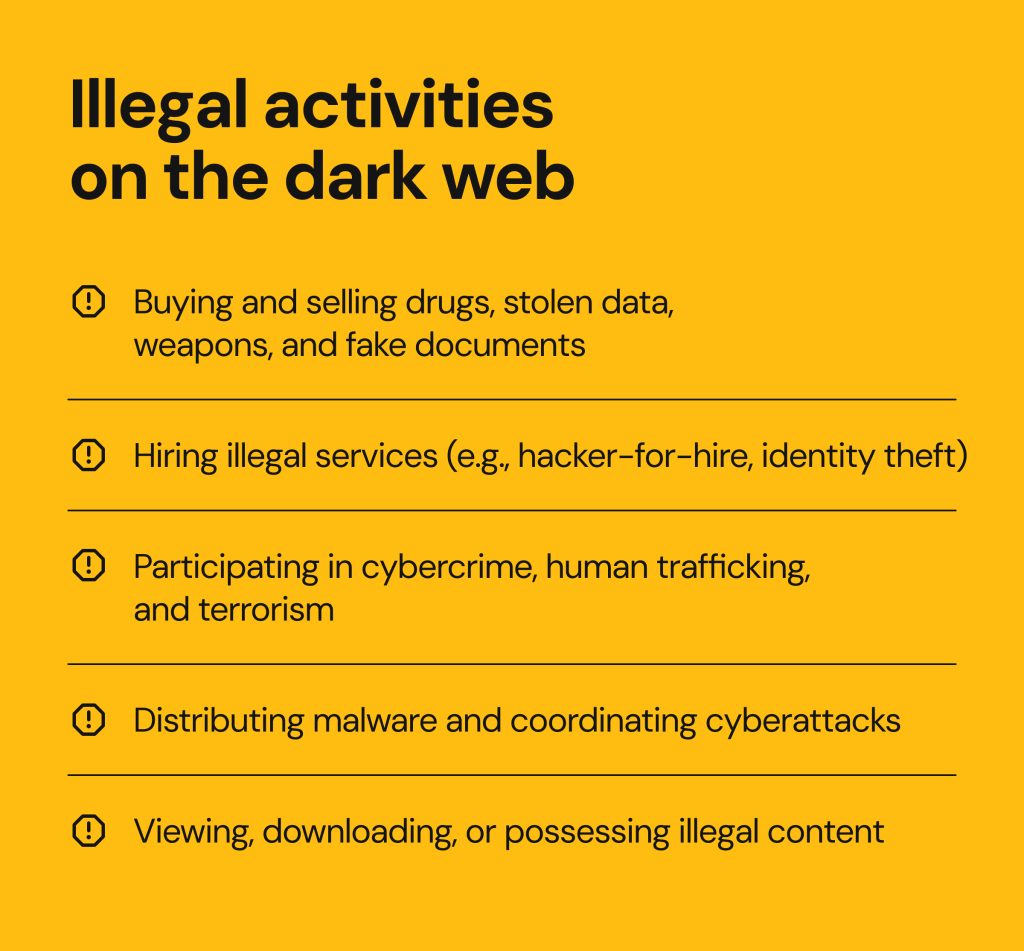
The bottom line is, if you’re engaging with legitimate dark web sources out of curiosity, for research purposes, or to read uncensored journalism, you’re fine unless the use of Tor is restricted in your location. In all other cases, be extra cautious in terms of what you access and what kind of content you interact with.
What makes the dark web so dangerous?
Is the dark web safe for a casually browsing user? Beyond being illegal in some cases, using the dark web can be dangerous for a number of reasons. As a gathering place for cybercriminals, hackers, and scammers, it can pose risks for common users who might themselves become victims of malicious actors. From downloading infected files to encountering cybercriminals, the dark web harbors many threats for those who are not cautious enough.
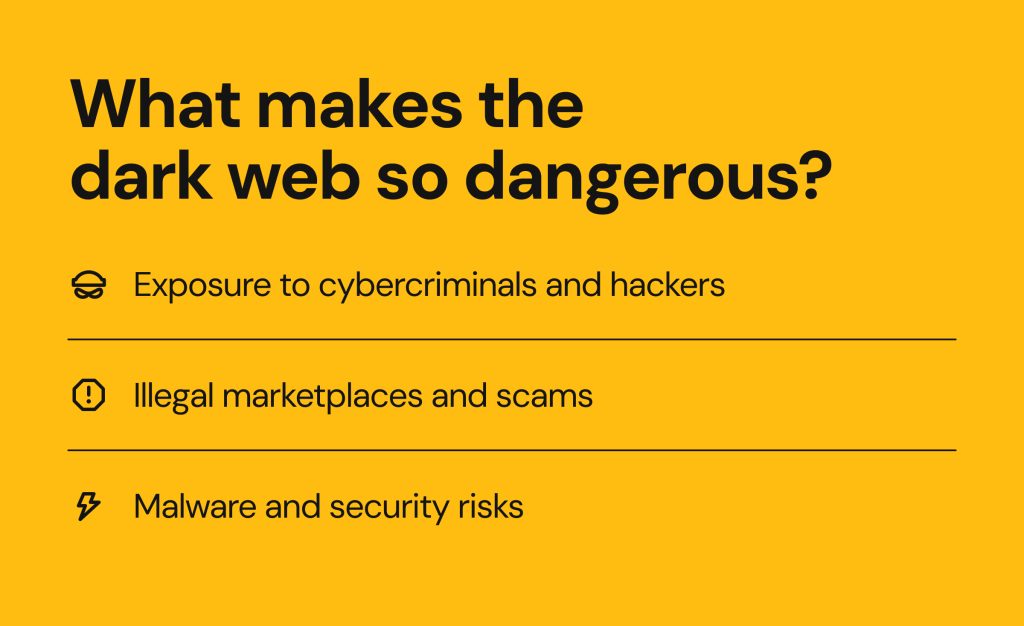
Exposure to cybercriminals and hackers
The dark web is home to very skilled cybercriminals and hackers. They’re commonly found on darknet marketplaces buying and selling illicit goods and services.
As a dark web user, you run the risk of becoming the target of identity theft, doxxing or phishing, especially as these cybercriminals are skilled in social engineering. You can be manipulated into revealing your personal information, which can be further exploited. On the dark web, you can never know who you’re interacting with, and that’s part of the danger in itself.
Illegal marketplaces and scams
Even though several illegal darknet marketplaces have been shut down by government agencies in recent years (most notably Silk Road, AlphaBay and Hansa), the trade of illicit goods and services still runs rampant on the dark web. These black markets are highly risky and, besides being illegal in the first place, can harm users in several other ways:
- Exit scams where sellers just take the money and disappear.
- Law enforcement stings where buyers and sellers can be caught by government agencies who can secretly run or monitor illegal marketplaces.
- Damage from unreliable products as you never know what you’re buying or whether you’ll receive it at all.
- You can face legal consequences for just browsing illegal websites, especially if the dark web is banned in your location.
Malware and security risks
You can unknowingly download malicious software, get hacked or become otherwise exposed to multiple security risks found on the dark web. These security threats can severely damage your digital systems or even result in your personal data and identity stolen unless you exercise great caution when browsing.
Some common security risks include:
- Remote access trojans that let hackers take control of your device.
- Keyloggers that, once installed on your computer, will track everything you type.
- Ransomware that will encrypt your data and prevent you from accessing it unless you pay.
- Drive-by downloads that can infect your device even if you don’t download anything.
How to stay safe on the dark web
The dark web isn’t inherently bad but everyone browsing it should stay vigilant and make sure to steer clear of anything suspicious and illicit. The dark web may put extra focus on anonymity, but this comes with extra risks, especially for the unprepared.
Safe browsing habits will help you avoid potential harm when using the dark web, and even beyond it. Anyone using the broader internet—individuals, parents, businesses—should stay alert to the risks of unintentionally exposing their personal data and becoming cybercriminals’ victims.
Use secure browsing practices
Accessing the dark web requires you to raise your cybersecurity awareness as it’s much riskier than casually browsing the open web.
Some of the most effective secure browsing practices, on the dark web and elsewhere, include:
- Using a virtual private network (VPN). It hides your IP address, encrypts the traffic and adds another layer of privacy.
- Browsing with Tor safely, which means you should keep the window full-sized at all times, disable scripts in the browser settings and never log into your personal accounts when on the dark web.
- Running trusted anti-virus and anti-malware tools to block malicious downloads and minimize phishing risks.
- Keeping your software updated to make sure it has the latest security patch installed. This includes the operating system, browsers and extensions.
- Protecting children from accidentally accessing the dark web. If you have Tor installed on your device, make sure children can’t access it. It’s also advised to implement parental control to ensure children don’t use the dark web on their own.
Avoid suspicious websites and links
When on the dark web, beware of the content you’re accessing. Even casual browsing is riddled with risks of exposure to illegal content, malware, scams and phishing attacks.
- Only access verified .onion resources you can trust.
- Never click on unknown or shortened links and don’t download any files, as these can be malware and phishing traps.
- Don’t enter any personal information and beware of impersonation and social engineering tactics. Even dark web websites with reviews and escrow systems can turn out to be scams.
- Ignore offers that are too good to be true, because for the most part, they are.
Keep personal information secure
You’ve seen how cheaply personal data is traded on the dark web, and yours can surface there too unless you stay cautious and follow these simple yet effective rules for protecting your privacy online:
- Don’t overshare your personal information on the internet, including social media and forums — your identity can be pieced together even from small details.
- Remove your personal information from the internet, including from data brokers and people-search websites, using services such as Onerep.
- Use strong unique passwords and multi-factor authentication for more effective authorization protection.
- Use identity theft protection services to monitor and secure your personal information.
- Use dark web monitoring tools to track if your personal data has been leaked or stolen and get alerted promptly.
- If you find out your data has surfaced on the dark web, act immediately by changing passwords, notifying your bank and freezing your credit to prevent unauthorized access.
Prevention is the best practice here, as it’s practically impossible to remove your personal data from the dark web once it’s there.
FAQs
Is the dark web illegal to access?
No, the dark web is in itself not illegal in most countries. Using anonymized browsers like Tor is permitted in many locations (except Russia, China and Iran) but users should stay cautious not to access illegal content, and there’s plenty of it on dark web websites. Accessing illegal content as well as engaging in illicit activities on the dark web (such as buying and selling drugs, weapons or stolen personal data) is illegal and can result in legal action against you.
Is it safe to use the Tor browser?
In locations where the Tor browser is permitted, it’s safe and legal to use it, but it also depends on how you use it. In itself, Tor is a tool for anonymity and, while protecting your privacy on the dark web, it doesn’t guarantee your safety. Be cautious and apply secure browsing practices for better protection in addition to staying away from engaging in any type of illegal activity.
Can you get hacked by visiting the dark web?
Yes, you can unless you’re extra careful. You can run into cybercriminals, hackers, scammers and fraudsters. To avoid becoming a victim of a scam, a phishing attack, or malware, follow the safe browsing best practices, use a VPN, keep your antivirus software updated and never share your personal details, otherwise you risk exposing your identity to malicious actors.
Is the dark web the same as the deep web?
No, they are not the same, although the dark web is part of the deep web. The deep web is the collection of all the online information that’s not indexed by search engines, like private databases, academic archives, medical and banking records, etc. The dark web is a small portion of the deep web hidden from search intentionally and the one that you can only access anonymously using special software like the Tor network browser.

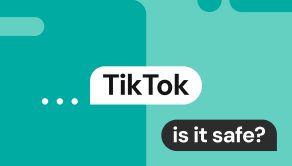

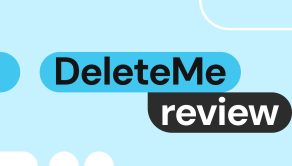

Dimitri is a tech entrepreneur and founder of Onerep, the first fully automated data removal service. Top cybersecurity CEO of 2021 by The Software Report.